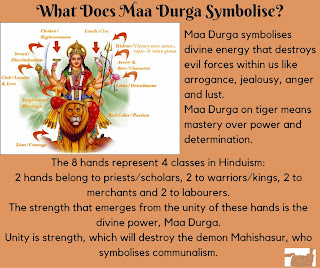Navratri and Spiritual Progress
Navratri and Spiritual Progress
Navratri, a significant Hindu festival celebrated over nine
nights, holds deep spiritual and cultural importance. It signifies the triumph
of good over evil and the divine feminine energy's manifestation in various
forms. Beyond the grand festivities and colourful attire, Navratri offers
profound lessons for spiritual growth and self-discovery.
Navratri is celebrated in honour of Goddess Durga, who
symbolises divine strength and protection. Each of the nine nights is dedicated
to one of her nine forms, and these forms represent different aspects of the
divine. The festival culminates with Dussehra, the day when Lord Rama defeated
the demon king Ravana.
From a spiritual perspective, the nine nights represent the
journey of the soul from ignorance to enlightenment. Each form of the goddess
signifies an aspect of the spiritual path, starting with innocence and purity
(Shailaputri) and progressing towards wisdom and knowledge (Saraswati). It is a
reminder that our spiritual journey involves a series of transformations, much
like the goddess's transformations during these nine nights.
Navratri encourages devotion to the divine, which is an
essential aspect of spiritual progress. Devotion cultivates a profound connection
with the divine and helps us overcome our ego and attachments. It is an
acknowledgment of a higher power and an act of surrender, which is fundamental
on the spiritual journey.
The act of fasting during Navratri is not merely about
abstaining from food. It symbolizes self-control and purification. Fasting
allows individuals to introspect, control their desires, and cleanse their
bodies and minds. It is a time for self-reflection and the removal of
impurities, both physical and spiritual.
Navratri's climax, Dussehra, represents the victory of light
over darkness. In a spiritual context, it signifies the triumph of the higher
self over the lower self or the ego. The story of Lord Rama's victory over
Ravana serves as a metaphor for conquering one's inner demons and realizing
one's true self.
Garba and Dandiya, the traditional dance forms of Navratri,
are not just forms of entertainment but also a spiritual practice. These dances
symbolize the cosmic dance of the divine, where every step is a step closer to
the divine. In the midst of the lively music and vibrant colours, participants
find themselves absorbed in the rhythm of life, symbolizing the harmonious
interplay of the divine and the mundane.
Navratri is a time when devotees seek the blessings of the
divine mother. In seeking her blessings, individuals express their humility and
surrender to a higher power. This act of seeking, devoid of ego and desire, is
an essential aspect of spiritual growth. It reminds us that our journey is not
solitary but guided by the divine mother's grace.
Navratri encourages the celebration of life and the
renunciation of worldly desires. It teaches that one can be in the world but
not of it. Celebrating Navratri involves dressing in vibrant attire, engaging
in music and dance, and feasting, all while maintaining a sense of detachment
and devotion.
The Raas Leela, a dance depicting Lord Krishna's play with
the gopis, is often performed during Navratri. It carries a deep spiritual
message. Krishna's dance challenges the ego and attachments. The dance
represents the ultimate surrender to the divine, transcending the worldly
desires and the limitations of the ego.
Navratri brings communities together in celebration. This
sense of unity and togetherness reflects the importance of community support on
the spiritual journey. The collective energy of devotion, prayer, and
celebration can be a powerful catalyst for individual growth.
Navratri occurs twice a year, in the spring and fall. This
duality symbolises the cyclical nature of life and death. The festival reminds
us that life is a continuous cycle of birth, death, and rebirth. It is an
opportunity for renewal, transformation, and spiritual growth.
In conclusion, Navratri is not just a festival; it is a
spiritual journey. It signifies the awakening of the divine feminine within and
the recognition of the interplay of light and darkness in our lives. The
festival teaches us to celebrate, seek blessings, and renounce desires, all
while remaining connected to the divine. Navratri is a time for
self-reflection, inner cleansing, and devotion, serving as a powerful reminder
that the spiritual path is a journey of self-discovery, transformation, and
enlightenment.




Comments